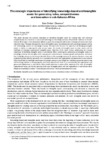| dc.description.abstract | This article discusses the strategic importance of identifying intangible assets for creating value and enhancing competitiveness and innovation in science and technology in a knowledge economy with particular reference to the sub-Saharan Africa region. It has always been difficult to gather the prerequisite information to manage such assets and create value from them. The paper discusses the nature of intangible assets, the characteristics of a knowledge economy and the role of knowledge workers in a knowledge economy. The paper also discusses the importance of identifying intangible assets in relation to capturing the value of such assets, the transfer of intangible assets to other owners and the challenges of managing organizational intangible assets. Objectives of the article include: underscoring the strategic importance of identifying intangible assets in sub-Saharan Africa; examining the performance of intangible assets in a knowledge economy; how intangible assets may generate competitiveness, economic growth and innovation; and assess how knowledge workers are becoming a dominant factor in the knowledge economy. An extensive literature review was employed to collect data for this article. It is concluded in the article that organizations and governments in sub-Saharan Africa should look at knowledge-based assets as strategic resources, even though the traditional accounting systems may still be having problems in determining the exact book value of such assets. It is recommended that organizations and government departments in sub-Saharan Africa should implement a system of the reporting of the value of intangible organizational assets just like the reporting of the value of tangible assets; and that organizations in sub-Saharan Africa should use knowledge to produce "smart products and services" which command premium prices. | en_US |

